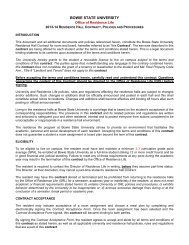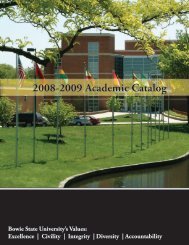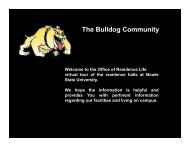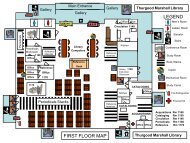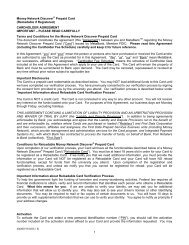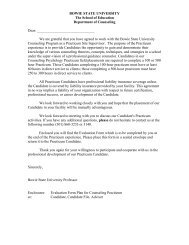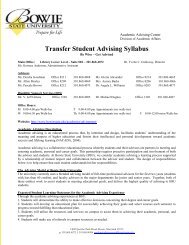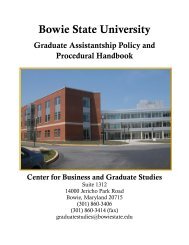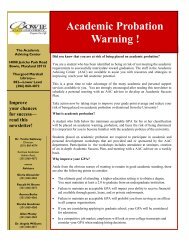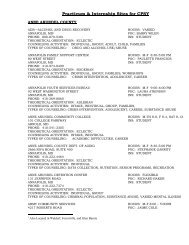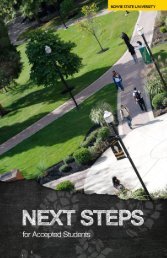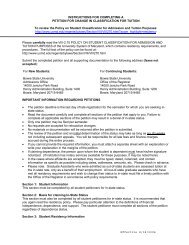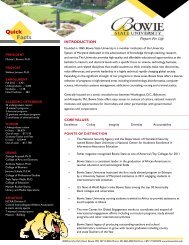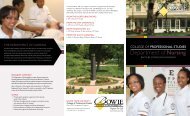2009-2010 - Bowie State University
2009-2010 - Bowie State University
2009-2010 - Bowie State University
Create successful ePaper yourself
Turn your PDF publications into a flip-book with our unique Google optimized e-Paper software.
SCED 304 METH TCHNG SECONDARY 3 CREDITS<br />
Prerequisite(s): PRAXIS I. This is an integrated methods course of practices and processes related to teaching in the secondary school. The<br />
course has two eight‐week segments. First eight weeks: General methods for all secondary students. Second eight weeks: Specific methods in<br />
the content area. Practicum III is taken concurrently. NTE: Specialty is taken with this course.<br />
SCED 305 PRACTICUM III 1 CREDIT<br />
Prerequisite(s): PRAXIS I. This course enables observation of model lessons in an elementary classroom, examination of curriculum materials,<br />
and teaching of selected lessons under the supervision of a master teacher. The practicum is completed on a designated day each week and<br />
continues for the full day. This practicum must be taken with methods courses. PK is required to apply for Student Teaching. Application is<br />
made to Student Teaching.<br />
SCED 401 DIR TCHNG & SEMINAR SCED 12 CREDITS<br />
Prerequisite(s): Method courses and PRAXIS I required to apply. This is a semester‐long course in which the student participates in all of the<br />
activities of the teacher in the classroom, in the school, and in the community. Beginning with a period of observation and orientation, the<br />
student receives assignments of increasing difficulty from the cooperating teacher until he/she is capable of assuming full responsibility for<br />
teaching. The semester is divided into an assignment in the middle and an assignment in the senior grades. The practical experience is<br />
accompanied by a regularly scheduled seminar. The student teacher follows the entire schedule of the school at which the student is placed.<br />
SCED 450 METH TCHG READING SECOND 3 CREDITS<br />
This course is designed to give secondary teachers an understanding of various approaches to teaching reading in subject matter fields.<br />
Exploration of recent research in the area, how‐to lessons, and an examination of reading philosophy and literature as applicable to the<br />
secondary student<br />
SOCI: SOCIOLOGY COURSE DESCRIPTIONS<br />
SOCI 101 INTRO TO SOCIOLOGY (Fall, Spring) 3 CREDITS<br />
Note: This course is a Prerequisite(s) for all sociology/criminal justice majors. This course is a survey of basic concepts and formulations in<br />
sociology, such as functional, conflict, and interaction perspectives, as they are applied to the study of structure and process in society, from<br />
the group to the institutional level.<br />
SOCI 198 COOP‐SOCI 12 CREDITS<br />
SOCI 201 WRITING FOR THE SOCIAL SCIENCE 3 CREDITS<br />
The course allows students to refine their skills in scholarship and writing in the social sciences. Students address the issues of evidence,<br />
interpretation, methodology, and critique in social science research as part of a longer project.<br />
SOCI 203 DEVIANT BEHAVIOR (Spring Only) 3 CREDITS<br />
Prerequisite(s): SOCI 101. This course examines various forms of deviant behavior, including homosexuality, alcoholism, mental illness, drug<br />
addiction, rape, child molestation, etc.<br />
SOCI 211 CYBERSPACE, THE INDIV & SOC 3 CREDITS<br />
Cyberspace is the name given to the space' where humans and modern information/communications technology interact. This course explores<br />
the personal cultural and societal implications of cyberspace computer mediated communications (CMC) and the Internet. It examines<br />
contemporary technological advances comparing and contrasting them with the effects of previous technologies such as the printing press<br />
telephone radio and television. It presents current work in sociology psychology communications political science popular culture and<br />
information and computer science in order to help students gain an understanding of the impact that advanced information/communication<br />
technologies have on society: education business. religion civic engagement health care government commerce and international relations.<br />
Students taking this course should have a basic understanding of how to access readings communicate and conduct research online.<br />
SOCI 232 WORLD POPULATION PROBLEMS 3 CREDITS<br />
A study of the world population problems in broad perspective. Birth rates are analyzed and alternative strategies for population control are<br />
reviewed. Special emphasis is placed on large urban areas in Asia, South America, Africa, the Middle East and the United <strong>State</strong>s.<br />
SOCI 298 COOP‐SOCI 12 CREDITS<br />
SOCI 302 JUVENILE DELINQUENCY (Fall, Spring) 3 CREDITS<br />
Prerequisite(s): SOCI 101. This course examines the characteristics of American culture that create the problem of juvenile delinquency and<br />
provides students with comprehensive knowledge concerning the control, treatment, and rehabilitation of juvenile delinquents.<br />
SOCI 304 SEX ROLES MARR & FAMILY (Fall, Spring) 3 CREDITS<br />
This course is a study of male/female roles in society, the processes of courtship and marriage, alternative forms of cohabitation, and the family<br />
institution.<br />
SOCI 305 CRIMINOLOGY (Fall, Spring) 3 CREDITS<br />
Prerequisite(s): SOCI 101. This course is an examination of crime in the United <strong>State</strong>s, the causes of criminal behavior, and problems of<br />
rehabilitation as related to crime.<br />
SOCI 307 SOCIOLOGICAL THEORY (Fall, Spring) 3 CREDITS<br />
Prerequisite(s): Junior Standing (Second Semester). This course is a critical analysis of the development of sociological thought and<br />
concepts. Emphasis is on theoretical systems, and includes contemporary theory<br />
SOCI 309 ELEM STATISTICS IN SOCI (Fall, Spring) 3 CREDITS<br />
Prerequisite(s): SOCI 101. This course is an introduction to techniques used to analyze and interpret data, and includes one‐variable<br />
distributions, two‐variable relationships, and statistical inference.<br />
SOCI 310 RACE/ETHNIC RELATIONS (Spring Only) 3 CREDITS<br />
This course provides a sociological approach to the understanding of race/ethnic relations in the United <strong>State</strong>s and elsewhere; analyzes various<br />
ethnic groups and the problem of assimilation.<br />
SOCI 398 COOP‐SOCI 6 CREDITS<br />
SOCI 400 PRAC IN SOC/CRIM JUS (Fall, Spring) 3 CREDITS<br />
Prerequisite(s): Senior Standing and Prior Arrangements with Practicum Director. This course provides practical experience in settings where<br />
students are exposed to applied Sociology/CRJU in such areas as corrections, juvenile services, law enforcement agencies, and mental health,<br />
<strong>Bowie</strong> <strong>State</strong> <strong>University</strong> 389




